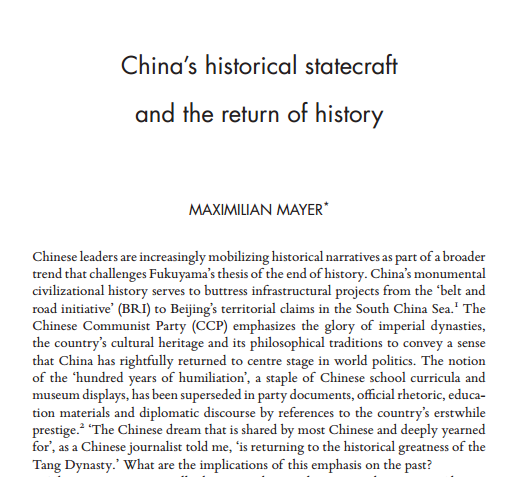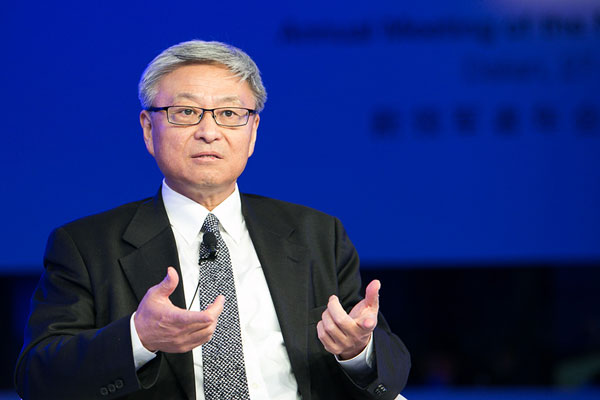
"Although China studies articles and books are becoming larger than ever before in terms of quantity, China studies in the West has lost its academic relevance and is on the verge of death" - The obituary for "Western China studies" by political scientist Zheng Yongnian
🪡
1/n
🪡
1/n

Zheng's essay should be read under the context of the CCP's "historical statecraft" (h/t @mayer_iras). Chinese nationalists have built a narrative of a "Chinese civilization-state" with the world's longest unbroken history of 5000 years, to contrast with... 

...other civilizational constructs (mostly Western "civilization"), in order to convey a sense of Chinese superiority in morality and institutions.
In an increasingly globalized world, a discourse of "othering" can be used by the group to highlight its perceived constructs and strengthen its cohesion.
It is from this perspective that Zheng says "Sinology in the West had reached an apex during the European Enlightenment in the 18th century. China was viewed as a symbol of reason, enlightenment, and civilization by European scholars of the period.
"This positive view of Chinese civilization and culture prompted Europeans to conduct extensive research into Chinese Confucianism, Taoism, Buddhism, and various folk religions."
Except for a brief period after reform and opening [post 1978], it mostly went downhill from there.
Except for a brief period after reform and opening [post 1978], it mostly went downhill from there.
"After the 1980s, Chinese studies were gradually subsumed into various social science categories such as political science, sociology, anthropology, and so on, while traditional language, culture, history, and literature were relegated to the field of "regional studies.""
Zheng cites three reasons for the decline in the quality of Western China studies:
1) "They can't see the forest for the trees" - Chinese studies research skipped the macro and meso stages and went straight to the micro stage. The result? the more people study, the less they know
1) "They can't see the forest for the trees" - Chinese studies research skipped the macro and meso stages and went straight to the micro stage. The result? the more people study, the less they know
"They are constantly pursuing so-called scientific methods, polls, quantifications, enumerations, models, and so on. They mass-produced research articles, and there's no shortage of top journals that would accept them. However, the majority of them are incomprehensible."
2) "The second reason is ideological. Comparing China to other countries is inherently constructive... comparison has become a tool for Western scholars to promote their ideology... With the deterioration of Sino-US relations, this situation has become increasingly severe."
3) "Third, not only in terms of ideology and values but also in terms of cultural prejudice, the western "civilization superiority theory" severely restricts western scholars' empirical research on China... Western scholars have no tolerance for Chinese civilization...
"Civilizational superiority makes it difficult for even those scholars who have a positive attitude toward China to look at it objectively."
What's worse, according to Zheng, is that the West as a whole is "Americanizing," and even China studies in the East - China included - face a similar problem or even more severe challenges.
He concludes by describing the "absurd" situation in China studies today, during what he refers to as the "Cold War between China and the US." That is, despite the fact that more resources are funneled into China studies today, they are used to replace Cold War Soviet studies.
“The Cold War's impact on the social sciences in the United States cannot be overstated...
"The @RANDCorporation research model, which incorporates game theory, cross-disciplinary research, behavioral models, sand table deductions, and other methods, has had a significant impact on American social science, to the point where it has become the dominant school of thought
He then concludes with a series of open-ended questions: "Will the West's concern about China during the Cold War between China and the US result in a transformation and renaissance of Western social sciences?...
"What impact will this transformation and renaissance have on Western Chinese studies? Will increasing external pressure motivate Chinese scholars to establish China's own Chinese studies? All of these are issues that must be closely monitored in the future."
/End
/End
• • •
Missing some Tweet in this thread? You can try to
force a refresh









